|
|
|
|
I was the White House correspondent for The Canadian Press during the Barack Obama administration. I'd often go to Capitol Hill to take in the action. Even in the most peaceful of times and in possession of a press pass, the majestic Capitol was a very difficult building to get into. Security was similar to an airport on high alert. It felt like an honour to be admitted inside to walk its marbled hallways and watch American legislators at work.
That's why seeing the Capitol being ransacked by violent, Trump-supporting thugs on Wednesday was so shocking. The initially tepid response to the storming of Congress was infuriating – peaceful Black Lives Matter protesters earlier this year were confronted with much more deadly force than the white Trump supporters who raided the Capitol on Wednesday.
It's as though the Obama years were a dream – a flight of fancy that seemed to signal America was finally pulling away from its grim history of slavery and segregation. In just four years, Donald Trump has taken the country backwards, inciting violence every inch of the way, as Jack Rozdilsky of York University warned in his updated story today in The Conversation Canada. But the undercurrents of violence and racism have always been simmering just beneath the surface, making it easy for Trump to succeed.
The myth of American exceptionalism has rarely been so apparent. Far from Ronald Reagan's "shining city on a hill," the violence on Capitol Hill shows the U.S. is in serious trouble, shackled by systemic racism, a penchant for violence and a pathologically flawed system of government that exacerbates rather than eases inequity, bigotry and disenfranchisement. How or if it pulls out of the quagmire will be both painful and fascinating to watch.
We've pulled together stories on the U.S. crisis from across the global network of The Conversation. And we'll have more on the Capitol attack today, so please check back during the day.
|
Lee-Anne Goodman
Politics Editor
|

|
|
Attack on the U.S. Capitol
|
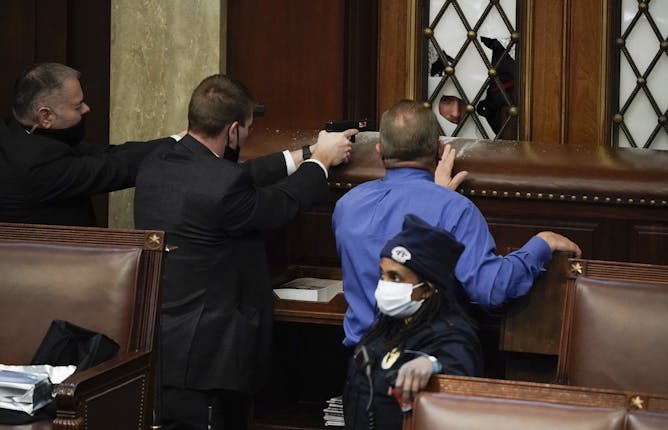
Police with guns drawn watch as protesters try to break into the House Chamber at the U.S. Capitol.
(AP Photo/J. Scott Applewhite)
Jack L. Rozdilsky, York University, Canada
As Donald Trump continued to stoke his base with false allegations of a 'rigged' election, violence at the U.S. Capitol shows America has devolved into a fragile state.
|
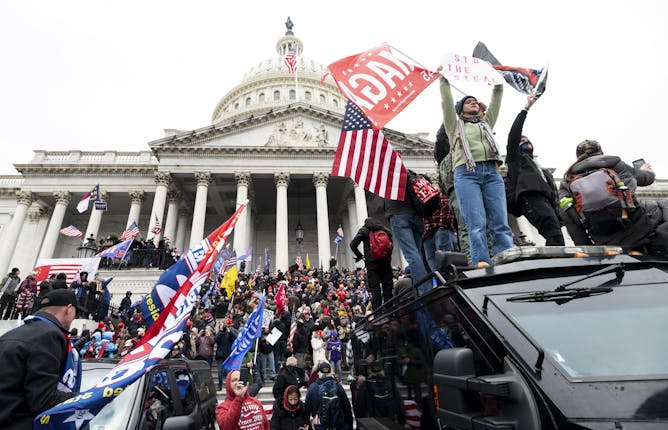
Insurrection at the US Capitol, Jan. 6, 2021.
Bill Clark/CQ-Roll Call, Inc via Getty Images
Clayton Besaw, University of Central Florida; Matthew Frank, University of Denver
Trump supporters stormed the US Capitol on Jan. 6, disrupting Congress's certification of Joe Biden as president-elect. Coup experts explain this violent insurrection wasn't technically a coup.
|
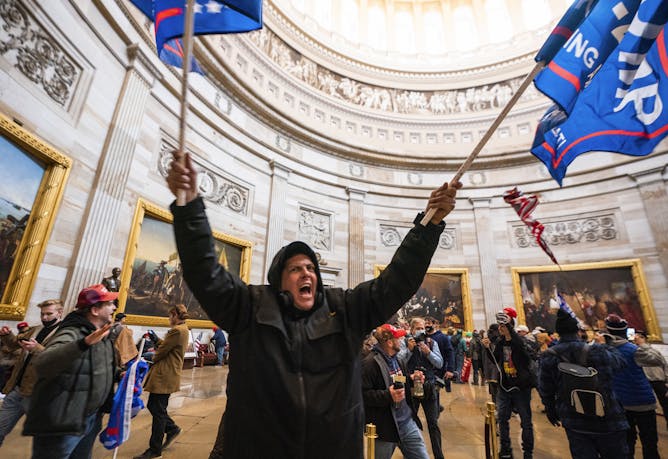
Jim Lo Scalzo/EPA
David Smith, University of Sydney
Trump has claimed for weeks the election is stolen. Having fired up his supporters in this way, it became much harder to control mob behaviour.
|
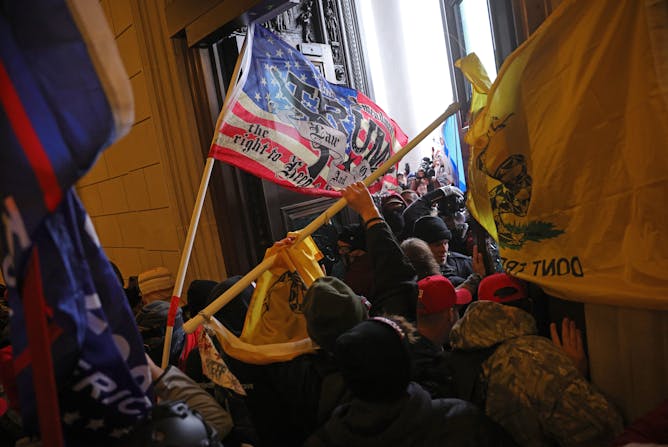
Protesters forcing their way into the Capitol.
Win McNamee/Getty Images News via Getty Images
Naomi Schalit, The Conversation
A conflict scholar calls events at the U.S. Capitol 'a messy riot where people lashed out at the heart of American democracy.'
|
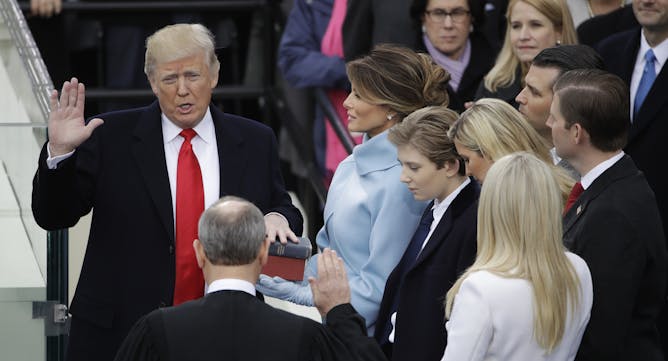
Donald Trump’s current term as president began on Jan. 20, 2017. It will end on Jan. 20, 2021, with the start of a new term – for him, or someone else.
AP Photo/Matt Rourke
Donald Nieman, Binghamton University, State University of New York
The framers of the Constitution were very clear that presidential terms have time limits. Not four years and a day. Not three years and 364 days. Four years.
|
Other top stories
|

Anxiety and other negative emotions can cause us to spread misinformation.
(Shutterstock)
Jaigris Hodson, Royal Roads University
As fake news and propaganda increase, a worthwhile New Year's resolution is getting out of the habit of spreading misinformation. And like any habit, becoming aware of triggers is the first step.
|

If you’re getting bored of your usual fitness routine, there are many online options to try.
(Julia Daun)
Amanda Wurz, University of Calgary; Justine Dowd, University of Calgary; Lauren C. Capozzi, University of Calgary; Nicole Culos-Reed, University of Calgary
The restrictions put in place during the COVID-19 pandemic have led to boom in online fitness opportunities. Here's what to look for in online classes.
|

The COVID-19 pandemic has illuminated the need for Canada to develop a global health policy.
(Pixabay)
Erica Di Ruggiero, University of Toronto; Garry Aslanyan, University of Toronto
There's no better way and better opportunity for Canada to prove it can be a world leader than now, with a comprehensive global health strategy for the post-pandemic era.
|

A protest march in Kolkata in support of farmers. Women have been central to the recent protests.
(AP Photo/Bikas Das)
Navjotpal Kaur, Memorial University of Newfoundland; Sumeet Sekhon, University of British Columbia
The active participation of women in India's farmers' protests shows that the demonstrations are not only spaces of resistance and power but also of gender equity and empowerment.
|
| |
| |
| |
| |
| |
| |
|
|
|
|
|
|
|